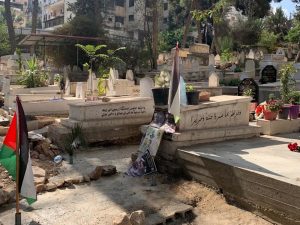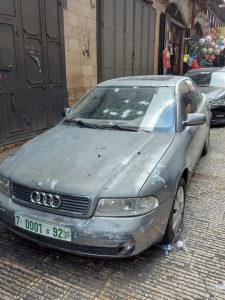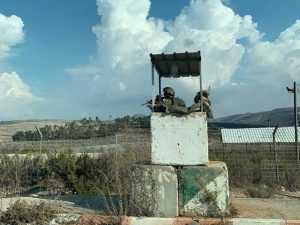The following article, written by Mary McGregor of the Republican Socialist Platform, is based on her recent visit to Nablus in Palestine as part of the Dundee delegation. It was first posted by Heckle.
NABLUS, MOUNTAIN OF FIRE — CENTRE OF A NEW PALESTINIAN RESISTANCE
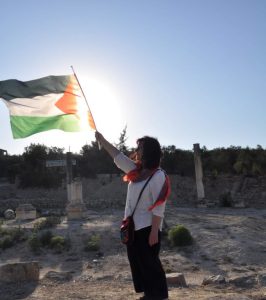
For many decades, Nablus has been seen as one of the centres of Palestinian resistance against the illegal and brutal Israeli occupation. The will to survive, not as slaves but to be free, runs deep in the psyche of its people.
It comes as no surprise, therefore, that frustration at the factionalism between Hamas and Fatah and the ineffectiveness of the Palestinian Authority has led to the creation of a new group of young fighters.
The Lions’ Den is a group who have emerged since the murder in July of Ibrahim al-Nabulsi and others by Israeli forces. The daily killing of young Palestinian men and children by the Israelis and the powerlessness of the PA to protect its citizens has led many Palestinians to self-organise.
The Lions’ Den has attracted support not just in Nablus but across Palestine. They have been set up as a non-partisan and non-sectarian group who aim to unite Palestinian factions under one banner. Their sole aim is to fight the occupation.
On 10th October, occupation forces imposed a siege on Nablus. Blocking all entrances and exits to the city, they effectively turned it into a prison. 171,000 people were locked down.
On Monday 24th October, massed Israeli forces stormed into the old city and gunned down five young men, only two of them members of the Lions’ Den group. Dozens of people were injured.
Nablus was under siege for almost three weeks. The siege — a form of collective punishment — was only lifted the day after the announcement of the Israeli election results. This was the same day we travelled to Nablus.
Dundee City has been twinned with Nablus since 1980. A delegation from Dundee-Nablus Twinning Association arrived in Nablus a week after the storming of the city.
In the run-up to the visit, we were constantly debating whether we should go, given concerns for our own safety. We also did not know if we would get to Nablus given the siege. However, we decided to try to get through, feeling that there was no more important time to show solidarity with our sisters and brothers there.
Getting there proved to be relatively easy, the blockade having been partially lifted at that point. Our short time there, however, threw into sharp focus the brutal, all-pervasive nature of the occupation as well as the amazing resilience and determination of those in occupied Palestine.
The trauma of the recent killings was evident in everyone we met. This was my third visit to Nablus but even though I had been caught up in gunfire and tear gas at the Huwara checkpoint on a previous trip, I had never felt such tension in the city as I did this time. Military drones were constantly overhead. Overnight gunfire was a relentless feature.
The destruction in the old city was sickening. Cars and buildings were pitted with bullet holes.
The people, understandably, were hyper-vigilant, particularly as undercover Israelis had flooded the city prior to the attack. We were “checked out” by organised Nablusi youth who were part of the resistance. Phone trees warned locals of imminent attacks. We met the father of one of the young men who had been “collateral damage” and visited the graves of the martyred youth. Heartbreak was only matched by determination to end the occupation.
In discussions with our contacts, any lingering hope of a two-state solution had evaporated. It was clearly seen as a nonsense with the question constantly being asked: what kind of state the Palestinians would have and who would control it? With more than half a million settlers in the West Bank, no one believes that Israel will give up stolen Palestinian land.
The settler activity is increasing. Apartheid roads, exclusively for settlers and Israelis, are being further improved, leading to comparatively luxurious settler towns. Often these towns and roads are built by Palestinian labour working to feed their families. Israel is increasingly seeing the Palestinians as a slave class.
Settlers constantly harass Palestinian farmers, destroying or stealing their olive trees. They pollute their farmland by diverting sewage into their fields. Their aim is to drive the Palestinians off their land. House demolitions also continue. It is hard to see what’s going on as anything other than a slow, deliberate genocidal process. This was echoed in extremist Israeli chants during the election of “Kill the Arabs! Burn the Arabs!”
The list of daily intimidation, humiliation and persecution of Palestinians is endless. Of course, there is also the situation in Gaza (an open-air prison) and in Israel (the ’48). All of this makes the resistance even more remarkable and heroic.
Palestinians resist in many ways. The NGOs we visited, SEEDS and Witness Centre, offer training opportunities for young people. Project Hope coordinates international volunteers in the city and refugee camps. The refugee camps in Nablus coordinate activity for young people and disabled groups. Music, poetry, song, dance embroidery, ceramics and painting are all forms of resistance. They are testimony to the enduring humanity of the Palestinians.
An-Najah University is rated in the top 50 in the Arab world. The people of Nablus refuse to submit to Israeli occupation.
Like so many people in struggle around the world, the Palestinians deserve better leadership. There are movements within to change the PLO and transform the Palestinian Authority. This is being spurred on by activities of the Lions’ Den group.
International pressure must be intensified. The recent elections in Israel can only indicate an even more hard-line approach towards the Palestinians.
We must call out Israel at every opportunity. The boycott, divestment and sanctions (BDS) movement does influence the apartheid Israeli state and unequivocally we should support it. Many people have become reluctant to speak out for fear of charges of antisemitism, and Palestinians fear that the world is forgetting them. Our trip was important in showing that international solidarity will continue until Palestine is free.
17.11.22
- Mary and others who travelled from Dundee to Nablus will give a report-back in-person at the Unite the Union offices on Blackness Road, Dundeeon Thursday 24th November at 7pm.
-
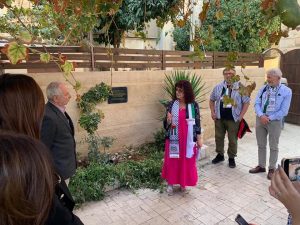
Part of Dundee delegation in Nablus, including Mary McGregor
___________
also see:-
Zionist attempts to close down the debate on Zionism lie in ruins – Tony Greenstein
Netanyahu – in alliance with the neo-Nazis – Tony Greenstein

